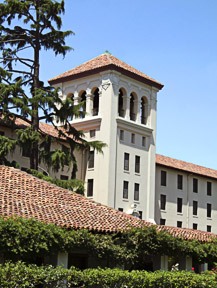Professor Brett Scharffs Featured at Santa Clara Law School Religion and International Law Symposium, 18-19 February 2011

ICLRS Associate Director Brett Scharffs was one of four featured presenters at a Symposium on Religion and International Law at Santa Clara University School of Law, held on February 18-19, 2011. Professor Scharffs’ paper was entitled, “Equality in Sheep’s Clothing: The Implications of Anti-Discrimination Norms for Religious Autonomy.” Three Commentators responded to Scharffs’ paper, Asifa Quraishi (Assistant Professor of Law at the University of Wisconsin Law School), Johann Van der Vyver (Professor of International Law and Human Rights at the Emory University School of Law, and former professor of law at the University of the Witwatersrand in Johannesburg, South Africa), and Tad Stahnke (Director of Policy and Programs at Human Rights First).
In his paper, Professor Scharffs discussed three recent cases that illustrate the ongoing tension between equality norms and religious freedom – an employment discrimination case from Ontario, Canada, a pair of German church autonomy cases recently decided by the European Court of Human Rights, and the controversy over Catholic adoption services in Massachusetts, the District of Columbia, and the United Kingdom. Scharffs argued that in each of these situations equality has been privileged over freedom in systematic, structural ways that bode ill for religious freedom. He then offered a series of suggestions about how the law can do a better job of vindicating the values of both equality and freedom. In particular, he suggested that courts and legislatures should give greater attention to values in addition to equality, including institutional autonomy and jurisdictional space for religious institutions. Second, courts should be aware of and check the tendency of secular systems to transform from a framework of secularity to a monochromatic imposition of secularism. Third, courts should focus greater attention to the value of conscience as illustrated in situations where rights of conscientious objection have been observed, and in the nearly forty years of experience we have had with “conscience clause” enactments on the state and federal level that seek to strike a balance between a woman’s right to an abortion, on the one hand, and the conscientious objection to providing abortions of some doctors, other health providers, and hospitals. Professor Scharffs also noted that equality is itself a complex concept with many competing conceptions, and urged courts and legislators to take a more nuanced view of what equality demands in various contexts.
The three other papers at the symposium were presented by Manisuli Ssenyonjo, a Senior Lecturer in Law at Brunel University in West London, Seval Yildirim, Associate Professor of Law at Whittier Law School, and Lama Abu Odeh, Professor of Law at Georgetown University School of Law. The Keynote Speaker was Robert A. Seiple, former Ambassador-at-Large for International Religious Freedom at the U.S. State Department. (Speaker bios here.)
The Conference was organized by David Sloss, Professor of Law and Director of the Center for Global Law & Policy at Santa Clara University Law School, and the student editors of the Journal of International Law. The papers from the conference, as well as the responses, will be published in the 2011 Santa Clara Journal of International Law.